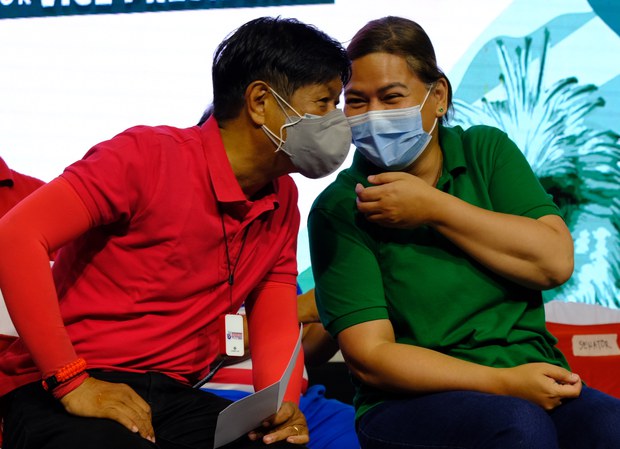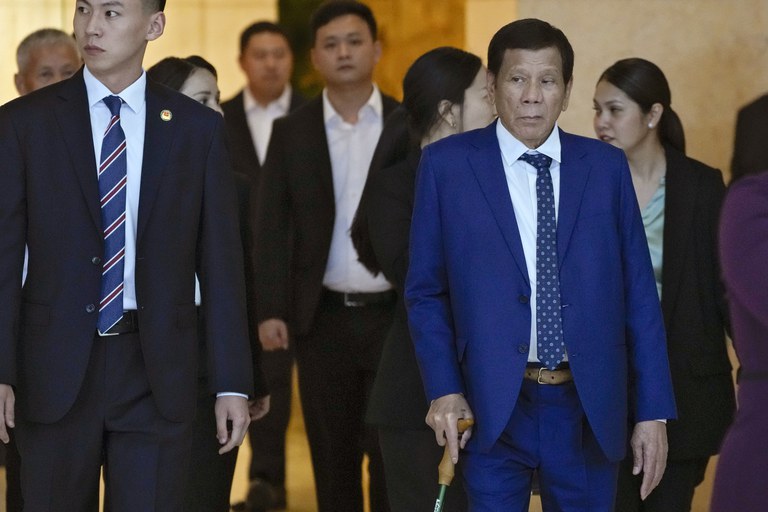Analysts: Collapse of Marcos-Duterte alliance to affect 2025 elections, foreign policy
2024.07.31
Manila
 Then-Philippine presidential candidate Ferdinand Marcos Jr. is seen in conversation with his running mate, Sara Duterte, during a campaign stop in Santa Rosa city, just south of Manila, March 11, 2022.
Then-Philippine presidential candidate Ferdinand Marcos Jr. is seen in conversation with his running mate, Sara Duterte, during a campaign stop in Santa Rosa city, just south of Manila, March 11, 2022.
After joining forces to win the national election more than two years ago, President Ferdinand Marcos Jr. and Vice President Sara Duterte have publicly called it quits, ending a short-lived, once-powerful political alliance.
Analysts said that the split between the two – both children of former presidents and scions of influential political families from the northern and southern Philippines – could impact foreign policy and the midterm elections in May 2025.
Cracks in the alliance – once described as a “marriage made in heaven” by a sister of the president – have surfaced in recent months, but were confirmed when Duterte resigned from Marcos’ official cabinet, and notably skipped his annual address to Congress this month.
“[Duterte’s] taken off her gloves,” Don McLain Gill, an international studies lecturer at the De La Salle University in Manila, told BenarNews on Monday. “It is likely that we would continue to notice more and more flashpoints between the two.”
For Jean Franco, a political science professor at the University of the Philippines, the divide was inevitable.
“I never, for one instance, believed that it’s going to be a long-term partnership. They merged because they just wanted to win,” Franco told BenarNews on Tuesday. “When it comes to policies, it was doubtful that they will sustain their partnership.”
The vice president’s father, former President Rodrigo Duterte, previously engaged his successor in a rift, with both leaders accusing each other of drug use.
The Duterte camp also has led protest rallies calling for Marcos’ ouster – though it never got widespread support.
Recently, the government recalled 75 police officers from the vice president’s security detail.
“Let us call it what it is – a clear case of political harassment,” Duterte described the move.

Shortly after her resignation, the Marcos administration seemed to have upped the ante, changing its tune on the issue of the International Criminal Court (ICC), which is investigating alleged human rights abuses in the drug war of the previous Duterte administration.
On Tuesday, Solicitor General Menardo Guevarra said that the government will not assist – but will not block – the ICC prosecutor’s proceedings. Previously, Marcos said the Philippines did not need outside investigators because the country’s justice system works.
“There is an anxiety in the Duterte camp of what could be,” Gill said. “There are concerns whether [Marcos’ stance] could change depending on whether or not they [Dutertes] continue to push away from the administration.”
In his speech to Congress earlier this month, Marcos said “extermination was never” part of his anti-drug strategy, an apparent criticism of his predecessor.
About 8,000 suspected dealers and addicts had been killed during the anti-narcotics campaign of the Duterte administration, the government said. But rights activists claimed the number could be much higher.
Harry Roque, Rodrigo Duterte’s former spokesman, told BenarNews on Wednesday that the rift between the Marcos and Duterte camps has become “irreconcilable.”
Midterm elections
Analysts expect the conflict to impact the May 2025 senatorial and local elections, with Marcos and Duterte likely fielding separate senatorial slates but possibly sharing some “guest” candidates.
In Philippine elections, “guest” candidates refer to bets, typically for the Senate, who are included in the electoral slates of multiple – and at times even opposing – political parties or coalitions.
To boost their winning chances, political parties and coalitions tap popular bets as “guest” candidates, a common practice in Philippine politics known for its weak and personality-driven system.
After Duterte resigned from the Marcos cabinet, some of her allies have been peddling her as the “new” leader of the opposition – a claim vehemently denied by those who have long been on the other side of the political fence.
“The sad thing is that the real opposition is being overshadowed by the quarrel of these two politicians. It’s dangerous,” Franco said. “It's not good for our democracy that the meaning of the opposition is being muddled.”
Foreign policy
The split also highlights the differing foreign policy positions of the two camps.
Marcos has rekindled the country’s alliances with the West, particularly with treaty ally United States – a sharp contrast to his predecessor’s pro-Beijing policy.
Sara Duterte has largely remained silent on China’s actions in the West Philippine Sea – which refers to Manila-claimed territories in the South China Sea – possibly to “indicate that she is the one trying to stabilize relations with China,” Gil said.
Since her father’s election in 2016, Sara Duterte has built strong ties with Chinese government officials in Davao City, her family’s hometown and where she twice served as mayor.
China opened its consulate in the city in 2018 when she served as mayor. That year, she also entered into a sister-city agreement with Jinjiang City in Fujian province. At present, Davao City has four sister-city deals with China.







